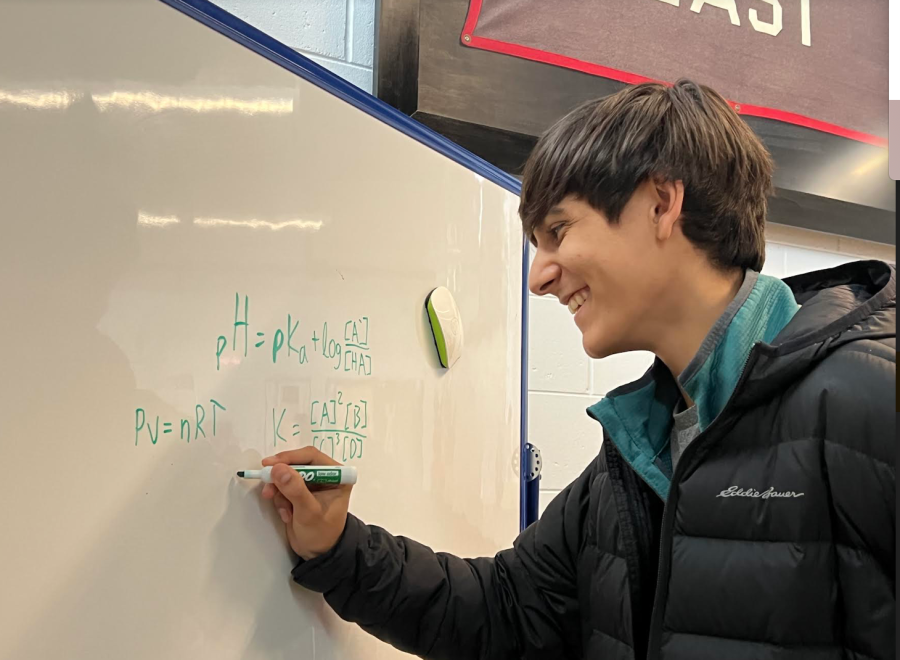Opinion: The Hardest Class at Brookfield East?
February 9, 2023
A semester’s worth of tears, hardship, and stress have finally paid off for the students in Mr. Harder’s AP Chemistry class. A mountain of a task to begin with, a standard AP class is a compilation of two semesters of college work in one semester. AP Chemistry pushes these boundaries further and is guaranteed to thrust oneself beyond their realm of expectation. Statistics collected by the College Board indicated that in 2021, less than 50% of students passed the AP Chemistry exam. Regardless, 30 brave Spartans took on this feat of intense academic rigor.
To preface, we interviewed various premier AP Chemistry students on their experience throughout the course. Every AP Chemistry student interviewed claimed that AP Chemistry was the single most rigorous AP class they had ever taken! Jacklyn Warber (11) described her jolly experience as “Really, really, really bad for lack of a better term (school appropriation).” Similarly, in a satirical manner, Hannah Yoo (10) described AP Chemistry as a “fun way to stay awake with bloodshot eyes, a textbook, and caffeine.” Shiv Muthupandiyan (11) added on by outlining AP Chemistry as “content-heavy, and [having a] demanding course load with tricky concepts.”
It gets worse from here. The homework? Brain-wracking. The tests? Indescribable.
Warber gave insight into her study schedule, commenting, “study[ing] all day on the weekends and at least 2 hours if not more a night.” Yoo elaborates, “it’s usually 40-50 problems a night, maybe with an additional supplemental assignment,” and these problems become exacerbated with “complet[ing] the homework AND study[ing] for the unit test, all in one week.” Warber describes a new hurdle, “the homework sometimes feels completely separate from what the test is actually like.” AP Chemistry is truly entering the big leagues. An anonymous interviewee stated, “test prep usually consists of me crying at my desk at 4 a.m.” Warber continues, “[there’s] no study guides, no hand holding, and when we receive a test outline, it’s very vague and concept based.” Kartik Ramachandrula (10) adds, “absorbing is instrumental, and it isn’t enough to learn the general concepts and formulas.” Yoo agrees, “Memorizing concepts is one thing, but I always get better results when I practice,” also crediting late-night chocolate as a motivational constituent.
Many of you are likely asking yourselves, “What makes AP Chemistry so hard, and what is the hardest concept in AP Chemistry?”
Based on the following interviews, a unanimous answer was formed. Equilibrium Titrations.
Although all may seem lost, there is still hope. The light at the end of the tunnel, the beam of sunshine in the darkness, Mr. Harder, is the gem of this course. Yuki Mitchell (10) describes Mr. Harder as having one of the most pivotal skills as a teacher. “Mr. Harder makes difficult material fun to learn. I laughed in his class every day, despite realizing how much homework I would have that evening.” Muthupandiyan shared similar thoughts, ” Harder is a great teacher. He answers questions well, knows what he’s doing, and puts up with my bad chemistry puns.” Yoo also touches on Mr. Harder’s comedic personality stating, “he knows how to make you laugh and picks on you just the right amount.”
AP Chemistry is no joke, but the satisfaction from the hard work is gratifying. Not only can you receive college credit, but this class also prepares you for the rigor of college Chemistry, which is often easier for students who pushed through AP Chemistry. If you are considering taking AP Chemistry in the following years, Mitchell advises you to steer clear and “enjoy Honors Chemistry while it lasts.” Warber, on the other hand, provides you with an alternative option,
“Pray.”



